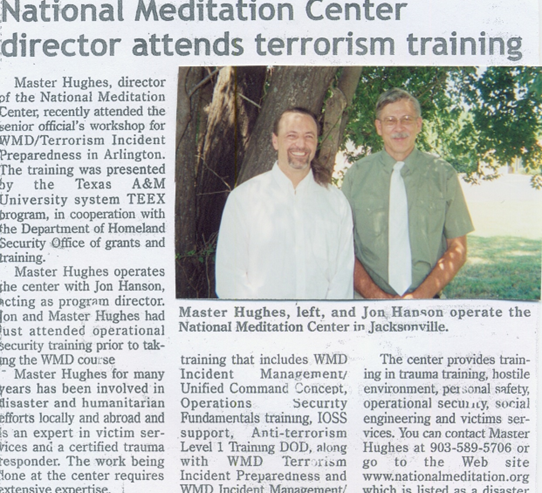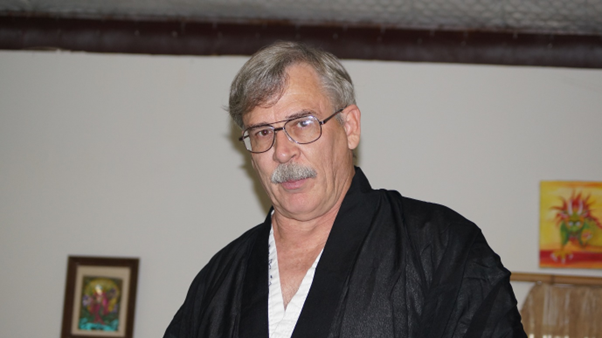Zen Master Hughes, also known as The Venerable Master Hughes or Roshi, is a prominent figure in American Zen Buddhism. In the heart of Texas lies a story of spiritual metamorphosis, embodied in the life of Zen Master Hughes a unique person, his journey into the profound realms of Zen Buddhism transformed him into a beacon of wisdom and serenity.
He Established the Dainoshin Ji, the National Meditation Center, which operated for over 20 years. During this time, he became a pillar of spirituality, guiding thousands towards mindfulness and inner peace. This article delves into the history and life of Master Hughes, tracing his path from his early days to becoming a Zen master who has been held in high esteem.
I will highlight his teachings, rooted deeply in Buddhist philosophy, and his impactful work, especially with troubled youth and law enforcement. I will also explore his unique approach to Zen, which emphasizes action and mindfulness as tools for personal and communal growth.
Zen Master Hughes’ story is one of transformation, not just of a man, but of the countless lives he helped, a testament to the enduring power of spiritual dedication and compassion. It is widely recognized that figures like him, who have been instrumental in bringing Zen principles into mainstream consciousness, can exert influence beyond the walls of monasteries. It should be noted that he is believed to be the most commendated Buddhist Master in the U.S.
His Buddhist name, Shinkai-kosei, meaning “Deep Ocean,” reflects his depth of knowledge and commitment to his practice. Master Hughes is known for his active engagement in Buddhism, defining action over opinions, and has been recognized for his extensive expertise and training
The journey, teachings, and impact of a Zen Master
In his youth, Zen Master Hughes was a seeker, drawn to the profound mysteries of life and spirit. Growing up in a modest family, he was exposed to various spiritual teachings, but it was the deep, resonating principles of Buddhism that captured his heart and mind. His early years were a tapestry of introspection and discovery, laying a strong foundation for his future spiritual path. This period was marked by an emerging awareness of the interconnectedness of all beings, a realization that would later become a cornerstone of his teachings.
As a young man, he delved deeper into Buddhist texts and teachings, finding solace and wisdom in the teachings of the Buddha. His growing interest in Buddhism was not just academic; it was a deeply personal journey that shaped his worldview and set the stage for his later emergence as a respected Zen master. This early phase of life was crucial, as it was here that the seeds of compassion, mindfulness, and a deep understanding of the impermanence of life were sown, seeds that would blossom into a life dedicated to teaching and guiding others on their spiritual journeys.
The Path to Zen
The transition of Zen Master Hughes from a layperson to a Buddhist clergy was a journey of profound transformation. Driven by a deepening connection to Buddhist principles, he embarked on a spiritual path that would redefine his life. This pivotal shift involved rigorous study, meditation, and immersion into the teachings of Zen Buddhism.
As he progressed, his understanding and practice deepened, leading him to dedicate his life to spiritual growth and being of service. This transition was marked by a series of milestones, each bringing him closer to mastery and, ultimately, to his role as a Zen master, guiding others on their spiritual paths. His journey symbolizes the potential for inner transformation and the pursuit of higher understanding in the realm of spirituality.
Zen Master Hughes found Buddhism when he realized other religions did not answer the realities of life. He states” I had too many questions that other religions did not answer. I started studying martial arts, I even worked with a relative of Bruce Lee. I realized there was so much I didn’t know. I wanted to seek truth not dogma. Since childhood I had never thought like the people around me. I saw how their minds whirled around very small worlds I felt the universe in a mindful way and wanted to expand my knowledge and walk a path full of truth and not bound by dogma.
Establishing Dainoshin Ji
Zen Master Hughes established the Dainoshin Ji (meaning Big Field Mind Zen Temple), also known as the National Meditation Center, over 20 years ago in Jacksonville, Texas. When he started the center, he wanted to provide a space that was not only conducive to meditation and spiritual growth but also served as a community center where people could learn, share, and apply the principles of Zen in their daily lives. The center was envisioned as a bridge between the traditional teachings of Zen and the contemporary challenges faced by individuals, fostering a community of mindfulness, compassion, and spiritual development. From my research, there are roughly 40 known articles on the center’s programs. He has been contacted by news agencies such as the Washington post, and in an article in the Houston Chronicle.
Teachings and Philosophy
Little exists of Zen Master Hughes’ teachings as he appears to be a private person. His unique approach to Zen Buddhism was shaped by his belief in action and practical application of spiritual teachings. He emphasizes mindfulness not just as a meditative practice, but as a way of life, integrating it into everyday activities and interactions. His approach involves a harmonious blend of traditional Zen teachings with contemporary issues, making Zen accessible and relevant. He also focuses on social responsibility, teaching that true understanding of Zen principles involves actively creating positive change in the world. This can be seen in the work that he did with many government organizations. This distinctive approach, combining traditional Zen with practical, action-oriented mindfulness, set him apart and resonated with many seeking a more engaged and applicable form of spirituality.
Below is a summary of his teachings.
Mindfulness and compassion
The core tenets of Zen Master Hughes’ teachings emphasize mindfulness, compassion, and the interconnectedness of all beings. He advocates for a practical approach to Zen, where mindfulness extends beyond meditation into every aspect of life. His teachings underscore the importance of compassion, not just as a feeling but as a way of engaging with the world.
Engaged Buddhism
Zen Master Hughes often spoke about Engaged Buddhism in his teachings. That is to say, practising compassion and mindfulness while helping people and the community. He encourages his students to use their meditation practice to become more aware of what is happening in the present moment, and to use that awareness to take action in the world.
Unique aspects of his approach to mindfulness and spirituality
Zen Master Hughes’ approach to mindfulness and spirituality is distinguished by its integration into everyday life. He teaches that mindfulness is not just a practice for the meditation cushion, but a tool for every moment, encouraging awareness and presence in all activities.
His spirituality is deeply practical, focused on real-world applications and actions that reflect Zen principles. He emphasizes that true spiritual growth comes from how we live our daily lives, interact with others, and engage with the world around us. This practical, action-oriented approach makes his teachings accessible and applicable to a wide audience, transcending traditional meditation practices.

His Work, Recognition and a lasting impact
Zen Master Hughes has made significant contributions to the community, particularly through his work with troubled youth and law enforcement. The impact of his work has been recognized through various awards and accolades, including commendations from the Texas House and the U.S. Department of Justice. His approach has transformed many lives, as reflected in anecdotes from individuals who have found solace, guidance, and transformation through his teachings. These stories highlight the profound and lasting impact of his work in the community.
- Trained government, law enforcement and crisis center’s
- Worked with troubled and violent youth to connect with themselves
- Provided a range of security training to law enforcement, prison guards even military members, and worked with victims he has been recognized by the Office for Victims of Crime, bringing his unique approach of mindful compassion.
- Provided NASA, Boys and Girls Club of America, and humanitarian workers with training about traumatic stress and antiviolence programs.
Awards and recognition
- the United States Department of Justice Office for Victims of Crime in 2006
- In 2005 and 2007 he was honoured in the Texas legislature, recognizing him as an esteemed advocate of the state of Texas.
- He was also recognized by the Governor Perry’s office for his “commitment and generosity to community in the Lone star State”.
- By State Representative Chuck Hopson for his leadership and work in rural and community development
- Congressman Jeb Henserling and Senator Cornyn for his involvement in Humanitarian causes. These commendations have been verified.
A Zen Master’s Legacy
In his later years, Zen Master Hughes has embraced a more secluded life, a reflective period marked by deep introspection and continued spiritual practice. He moved to Conroe, outside of Houston, Texas and he presently does not meet with anyone except by invitation. He currently dedicates his time to “Zen in the Woods,” a website that reflects his enduring commitment to Zen teachings and practices. He operates a small arborist business to pay for his daily needs and engages with his video production Hobby. It is said he now resides in a cabin near the big ticket in Texas.
This phase of his life is a testament to his lifelong devotion to spirituality and mindfulness. His legacy is not only in the teachings he imparted but also in the countless lives he has touched and transformed, a legacy that continues to inspire and guide seekers of spiritual wisdom.
Zen Master Hughes’ journey from a seeker of spiritual truths to a revered Zen master reflects a life dedicated to mindfulness, compassion, and practical spirituality.
His establishment of Dainoshin Ji and his unique approach to teaching have left an indelible mark on his students and the community. His work, especially with troubled youth and law enforcement, showcases the transformative power of his teachings.
As he now embraces a quieter life, his legacy continues through those he has guided and the enduring wisdom he has shared, illustrating the profound impact one individual can have in spreading peace and understanding. His life has touched thousands of individuals, yet you might say he is the Invisible Zen Master, He is like the spectrum of light, a lot of light is never seen, yet it affects everything in life, and yet few will see that hidden light.
.
In summary, Zen Master Hughes’ genius lies in his ability to blend spiritual teachings with practical applications, combined with his intelligence and dedication to humanitarian work, and his commitment to making a positive impact on society. His influence extends far beyond his local community, reaching out to individuals and organizations around the world.
Old articles found on the internet Article photo https://www.jacksonvilleprogress.com/jacksonville-meditation-center/image_81899753-c9c0-5e5f-8945-79b66a17eb33.html
https://www.nationalmeditation.org/zeninthewoods/about/about-master-hughes.html
https://www.nationalmeditation.org/zeninthewoods/articles/zen.html
https://www.nationalmeditation.org/zeninthewoods/articles/kids.html
There is an older photograph of Zen Master Hughes available on Wikimedia Commons and https://duckduckgo.com/?q=master+hughes&t=h_&iax=images&ia=images&iai=http%3A%2F%2Fwww.zen-in-the-woods.com%2Fimages%2Fimages-sensei-studio%2Fsensei-brown-bag.JPG






























